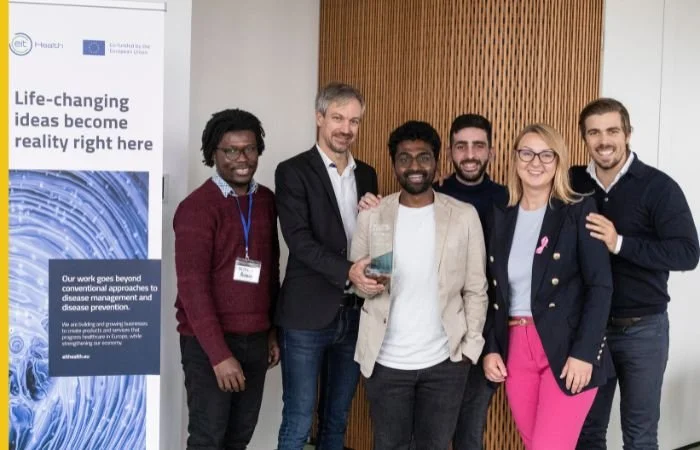EIT Health invests 3 million euros in disruptive, technology-driven solutions for the early detection of cancer
EIT Health, supported by the European Institute of Innovation and Technology (EIT) - a body of the European Union - announced its support for two innovator teams following the 2022 Wild Card Programme. German start-up, Bonescreen, and Italian start-up, NIB biotec, will be supported by EIT Health over the next two years, with up to 1.5 million euros in investment, mentoring and coaching, and access to EIT Health’s expansive network of investors and innovators across Europe.
The EIT Health Wild Card Programme plays a vital role in forming forward-thinking companies empowered with the knowledge and resources to tackle major health needs in Europe. Now in its fifth year, the annual Wild Card Programme invites talented innovators from across Europe to respond to challenge prompts with their cutting-edge ideas. Successful candidates are put into teams and paired with mentors to develop a business proposal and pitch. The shortlisted teams embark on a nine-week programme led by industry experts, where they receive world-class training and mentoring before delivering their investment pitches to an EIT Health panel. EIT Health then champions the two most promising ventures, providing access to funding and expertise.
The programme has served as a critical launch pad for successful ventures, with Wild Card alumni enjoying milestone breakthroughs in their quest to transform healthcare across Europe. Earlier this year, one of the selected ventures of the 2019 programme, iLoF, raised over 5 million euros in funding for its promising AI-driven drug discovery and development technology.
This year, a new class of innovators seized the opportunity to bring their solutions to life and reap the rewards of EIT Health support. Responding to the challenge prompts of “early detection of cancer” and “mental health”, innovators from every corner of Europe were selected to develop their knowledge, skills, and solutions to revolutionise these areas of healthcare. This year’s mental health challenge called upon applicants to contribute to strengthening access to care, accurate diagnosis, and more, while the early cancer detection challenge prompted teams to develop solutions to improve assessment and early detection tools.
Kurt Höller, Director of Business Creation at EIT Health, said: “This year’s EIT Health Wild Card Programme attracted some of the greatest minds in innovation, calling upon them to develop unconventional solutions to the challenges of mental health treatment and cancer detection. We are confident that the selected teams will make use of the wealth of expertise and resources on offer to develop their solutions and improve the early detection of cancer. We wish them every luck in this endeavour and enthusiastically support them on their journeys.”
About the teams selected
Bonescreen, a team of five innovators, aims to translate two decades of research in medicine and AI into a medical software that would enable oncologists, radiologists, and patients to assess bone health. Their solution would produce automatically generated reports to help healthcare professionals identify the early signs of cancer at no extra cost to patients or healthcare providers.
Italian venture, NIB biotec, is composed of four business professionals and scientists striving to develop a smart biosensor to diagnose prostate cancer. Using urinary molecules, the solution aims to make the diagnostic path of prostate cancer more efficient by minimising time in hospitals and decentralising exams. The team owns a patent that claims the use of a combination of urinary molecules as diagnostically and prognostically reliable biomarkers for prostate cancer.
In partnership with Hospital Sant Joan de Déu Children’s Hospital in Barcelona, EIT Health announced that the challenge of next year’s Wild Card Programme is children’s health.








